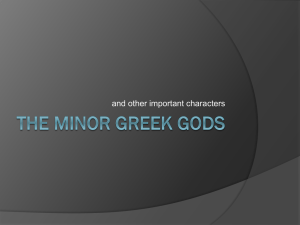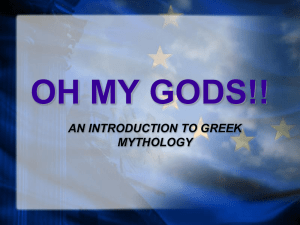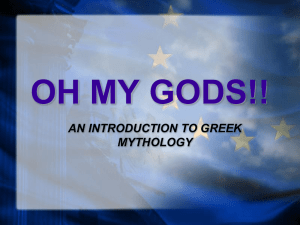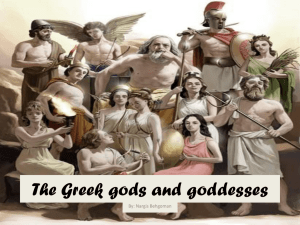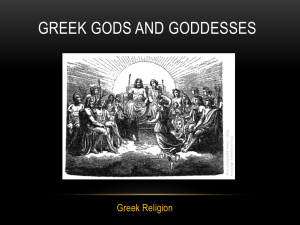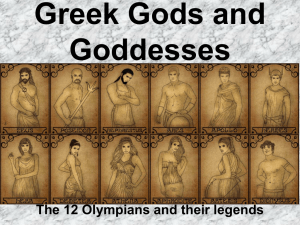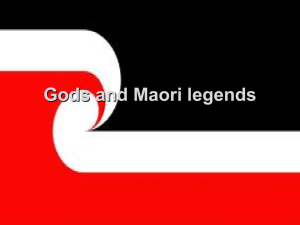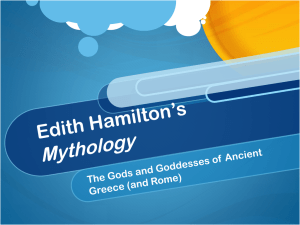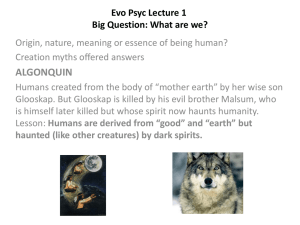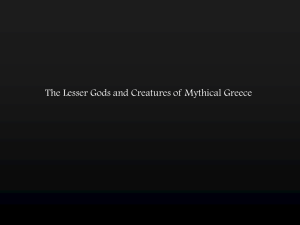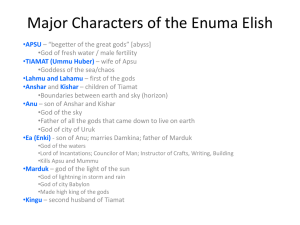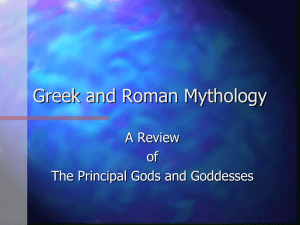mythology
advertisement
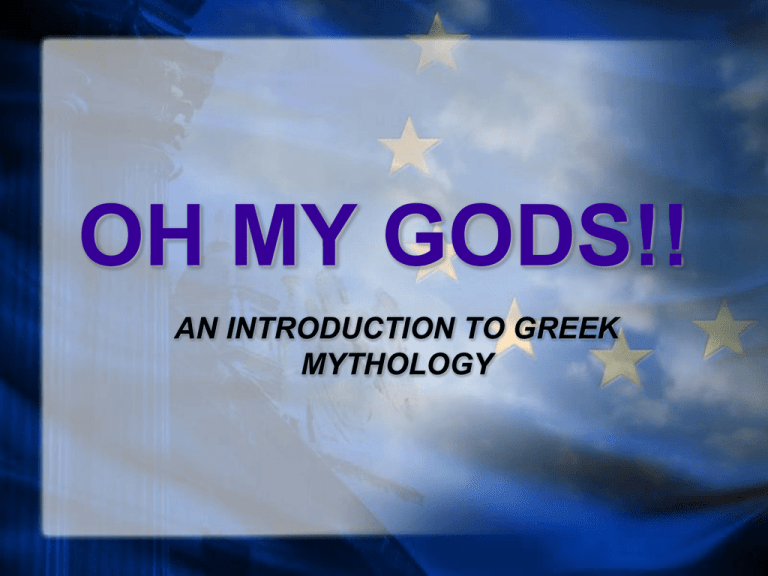
OH MY GODS!! AN INTRODUCTION TO GREEK MYTHOLOGY Mythlopedia-- “Oh My Gods!” Written by Megan E. Bryant Available via Scholastic Books Look in our book fair in January. WHAT IS MYTHOLOGY? “Mythology” is a word used to describe all myths of a particular society. Every culture has its own myths that help us understand its customs and ways of viewing the world. Mythopedia: Oh My Gods! by Megan E. Bryant WHAT IS A MYTH? A myth is a kind of story. Most myths have one or more of these characteristics: Myths are usually about gods or supernatural beings with greater powers and abilities than ordinary humans. Myths explain the origins of the world and how humans came to be. Myths take place a long time ago, usually in the earliest days of humanity (or just before humans showed up on Earth). Myths were usually thought to be true by their original tellers--no matter how wild or strange they seem to be. Mythopedia: Oh My Gods! by Megan E. Bryant TWO NAMES, POWERS THE SAME Many gods and goddesses have both Greek and Roman names. That is because the ancient Romans adopted a great deal of Greek mythology and made it their own. Often, they changed the names of the particular gods and goddesses. TWO NAMES, POWERS THE SAME Generally, the deity’s powers and myths stayed the same--even though they had a new name. As a result, the study of Greek and Roman mythology is often grouped together under the same name-classical mythology. WHAT IS THE PURPOSE OF MYTHS? Myths can… Explain how things came to be--like the origin of the universe or the creation of humans. Teach people about the values and beliefs that are important in their society. Contain deep religious significance to the people who tell and believe them. Studying myths can teach us about people around the world -- their cultures and what is (or was) important to them. Mythopedia: Oh My Gods! by Megan E. Bryant HOW DID WE LEARN THESE STORIES? Myths were first passed down through storytelling, songs, and poetry. We learned the stories from written versions, mainly Homer’s epic poems The Illiad and The Odyssey, which tell of the great deeds of heroes. Other sources were Hesiod’s Theogony, which describes the origins of the world and the gods, and Homeric Hymns, as collection of poems addressed to different gods. Mythopedia: Oh My Gods! by Megan E. Bryant DO MYTHS REALLY MATTER TODAY? YES!!! References to Greek mythology are all around us: Ever heard of Nike athletic gear? Nike was actually a goddess of personification and victory. What would Valentine’s Day be without Cupid? Cupid, or Eros, is the god of love as the Greeks called him. Does Apollo 13 ring a bell? The first crewed US space missions were named for Apollo, the god of archery and prophecy. BOTTOM LINE References to ancient myths are everywhere, from science to pop culture, and knowing about them will help you understand more about the world we live in. Before existence there was a vast nothingness called Chaos. Out of Chaos came Gaia, the earth, and Uranus, heaven or the sky. Gaia and Uranus gave birth to the Titans, who looked just like humans but were huge. They were the first gods and goddesses. Uranus banished some of them to the Underworld, which made Gaia upset. She encouraged them to rise up against him. They were led by Cronus who attacked and overthrew his father. Gaia Zeus Cronus married his sister Rhea and they had five children. Before they were born, Cronus was warned that they would overthrow him, the same way he had overthrown his father. When each child was born, he swallowed them whole. When Rhea gave birth to Zeus she wrapped a rock in blankets and pretended it was her son. Cronus swallowed the rock, and Zeus grew up hidden. Zeus grew up and visited his parents in disguise. He gave Cronus a drink that made him throw up all the babies he had swallowed. Zeus led his siblings in a revolt against Cronus and the other titans. The younger gods won and divided the world among themselves. Poseidon took the sea, Hades took the Underworld, and Zeus became King of all the gods. Hades The new gods were known as the Olympians. They lived on Mount Olympus, high above the clouds. No humans could visit Olympus unless by special invitation. The gods did visit the earth and some married humans. Their children, who were half-god and half-mortal often became heroes. IT’S ALL RELATIVE! Greek Mythology: The Gods and Goddesses The Olympian Gods OMG-WHAT LIFE WAS LIKE ON MT. OLYMPUS… IT WAS WILD!!! A certain god turned a nymph into a tree. A grumpy dad swallowed his kids oneby-one. A winged-cherub was accused of fly-byshootings. IT WAS LIKE A REALITY SHOW!! Zeus Title: King of the Gods o o o Wife: Hera Ruler of weather; keeper of laws; protector of Greek kings; guardian of morality Had over 115 girlfriends and wives and over 140 children!! WHO’S YOUR DADDY? APOLLO Title: God of Light and Sun o Twin of Artemis o Oracle of Delphi o If you were “struck by Apollo’s arrow,” it meant you died suddenly. o Killer of the cyclops who made Zeus’ thunderbolts POSEIDON Title:God of the Sea o Zeus’s brother and second most powerful god o Creator of earthquakes o Maker of horses HERMES Title: Messenger of the Gods o The god of secrets and tricks o Often portrayed with wings on his feet o Guided souls to the underworld o Patron of thieves and liars HADES Title: God of the Underworld Ruler of the dead Underground wealth Brother of Zeus and Poseidon Original “he who must not be named” ARES Title: God of War Disliked by gods and mortals for being bloodthirsty and a coward Lover of the goddess of love, Aphrodite HEPHAESTUS Title: God of Fire o Craftsman for the gods o Maker of fire o Mom, Hera, thought he was so ugly that she threw his off of Mt. Olympus o Married to Aphrodite DIONYSUS Title: God of drama, fertility, poetry, dance, song, wine Was born twice--cut out of his dead mom’s body and then sewn into Zues’s thigh until ready to be born Brought his mom back from the Underworld The Olympian Goddesses HERA Title: Queen of the Gods o Wife and sister of Zeus o Goddess of women and marriage o Known for her jealousy o Symbol is the peacock Athena Title: Goddess of Wisdom, War, and Crafts o Daughter of Zeus and Metis o Born from Zues’s head and came fully formed wearing armor o Symbol is the owl HESTIA TITLE-Goddess of houses; home; family; domestic life Hestia was wooed by the gods Apollo and Poseidon, but spurning both, petitioned Zeus to let her remain forever a virgin. ARTEMIS TITLE-Goddess of hunting, wilderness and wild animals. She was also a goddess of childbirth, and the protectress of the girl child up to the age of marriage Twin sister of Apollo Artemis expects her followers to stay away from boys, just like she does. HEBE TITLE- goddess of youth and the cupbearer of the gods who served ambrosia at the heavenly feast. She was also the patron goddess of the young bride and an attendant of the goddess Aphrodite. Personification of youth, is described as a daughter of Zeus and Hera APHRODITE Title: Great Olympian goddess of beauty, love, pleasure and and procreation. o Mother of Cupid o Caused the Trojan War Demeter Title: Goddess of Agriculture, the earth, and corn. o Her daughter, Persephone was kidnapped by Hades. o She cares for the earth and makes things grow. Next up, heroes and heroines in high adventure.
